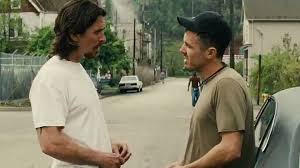 “Out of the Furnace” gets no credit for its good intentions because it collapses under the combined weight of pretentiousness and condescension. This is Hollywood’s idea of a searing drama about life in recession-era heartland, as phony as a painted backdrop. It is clearly intended to be a sympathetic portrait of two brothers betrayed by America. Russell (Christian Bale) lost his job when the steel mill closed down. His brother Rodney (Casey Affleck) went into the military and came home shattered by what he saw in four tours in Iraq. With no alternatives, their problems get worse. Rodney makes money in bare-knuckle fights, but keeps getting into trouble because he cannot bring himself to take a dive when told to do so by the fight promoter, Petty (Willem Dafoe). As their situations become more desperate, Rodney insists that Petty introduce him to meth dealer DeGroat (Woody Harrelson), so that he can make more money.
“Out of the Furnace” gets no credit for its good intentions because it collapses under the combined weight of pretentiousness and condescension. This is Hollywood’s idea of a searing drama about life in recession-era heartland, as phony as a painted backdrop. It is clearly intended to be a sympathetic portrait of two brothers betrayed by America. Russell (Christian Bale) lost his job when the steel mill closed down. His brother Rodney (Casey Affleck) went into the military and came home shattered by what he saw in four tours in Iraq. With no alternatives, their problems get worse. Rodney makes money in bare-knuckle fights, but keeps getting into trouble because he cannot bring himself to take a dive when told to do so by the fight promoter, Petty (Willem Dafoe). As their situations become more desperate, Rodney insists that Petty introduce him to meth dealer DeGroat (Woody Harrelson), so that he can make more money.
Co-writer/director Scott Cooper (“Crazy Heart”) tries to convey a sense of relentless pressure, crumbling infrastructure, and ever-constricting choices that force Russell and Rodney into making decisions with catastrophic consequences. But the film could easily be used to make the opposite points. Over and over, the brothers are told not to do something — like get involved with a murderous meth dealer — and they do it anyway. Russell is losing his job because the economy is bad. But he loses the girl he loves (Zoe Saldana) because he goes to prison. He goes to prison because he goes to a bar, gets drunk, drives, and causes an accident that kills two people. He has a lot of strong feelings and sense of loyalty for his brother and he is very upset about the death of his parents and his girlfriend leaving him for another man. When it comes to the innocent people he killed, he does not seem to have a sense of responsibility. We are supposed to be on his side because he is a decent guy who loves his brother, cares for his dying father, and misses his girlfriend, who married the decent local cop while Russell was in prison. But it is hard to be sympathetic when he — and the film — make no distinction between the limits imposed on him and the bad choices he made. Indeed, the movie ultimately becomes condescending, even contemptuous, in ignoring one of the core principles of narrative, which is respecting just that distinction. We are supposed to be on Rodney’s side because something in him, some core integrity, will not allow him to lose a fight he knows he can win. The metaphor is off-base and heavy-handed.
These are all great actors, and they all work hard to give good performances, but that in itself finally seems distancing. If they understood the essential humanity of the people dealing with these circumstances, the veterans struggling with PTSD, the factory workers whose jobs are gone, they would not distance themselves with such obvious artifice. Harrelson’s over-the-top sociopath seems to be from another movie entirely. Only Dafoe and Forest Whitaker as the sympathetic policeman create characters with any sense of authenticity, with Zoe Saldana relegated to a sad girlfriend role, doubly dreary because it is so tiresomely predictable. The real Russells and Rodneys deserve better, and so does the audience.
Parents should know that this film has very strong and disturbing violence with graphic images, fatal drunk driving accident, murder, brutal fight scenes, guns, description of wartime violence, constant very strong language, substance abuse, and non-explicit sexual situations.
Family discussion: What does the title refer to? Why do the characters constantly ignore advice that will keep them out of trouble? What does this movie want to say about our economy and political system?
If you like this, try: “Killing Them Softly” and “October Country”

